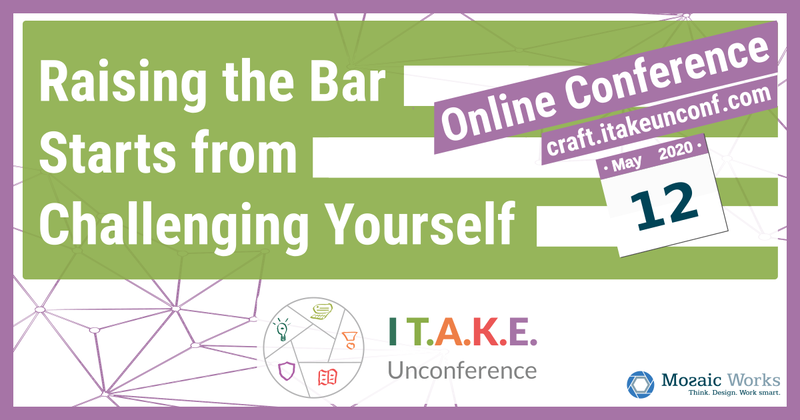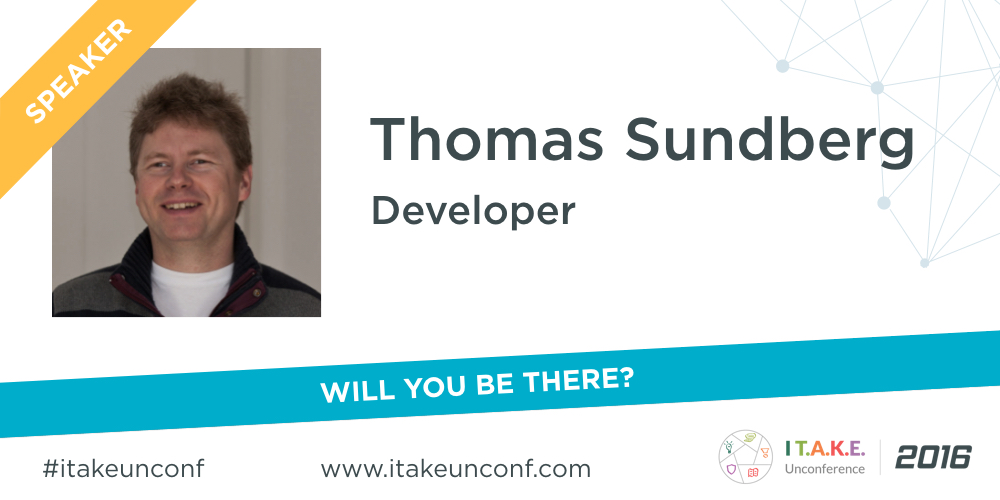Want to join Karina and ~300 software crafters from around Europe?
Register now for I T.A.K.E Unconference 2017!


After the well-received first online edition, I T.A.K.E. Unconference continues with the 8th edition on the 12th of May 2020, for Crafters.
Following our belief that #LearningNeverStops, we continue to bring together online international speakers and top-notch practitioners.
The theme chosen for the 8th edition is Craft: Raising the Bar Starts by Challenging Yourself and includes sessions on:
How is this edition of I TAKE Unconference special?
With a focus on practices and practicing, we invite you to explore together through remote live talks and live coding what software craft actually means: raising the bar.
Want to be part of this not-to-miss event? You are welcome to join our group of supporters and partners and bring innovation one step further. Just let us know and we can make it happen.
Let’s continue sharing knowledge by preserving the feeling of a community of peers who learn together, aiming to raise the bar by challenging oneself.

Enjoy the following series of interviews with the speakers, top-notch software crafters from across Europe, joining I T.A.K.E Unconference, Bucharest, 11-12 May. Discover the lessons learned and what drives them to challenge the known path in their field.
Karina Popova, Head of Development at Link Mobility, as been working as DevOps Lead last 10 years. At #itakeunconf she will include in her talk a lot of real working IoT use cases and their potential impact of a combination IoT with AI.
The five most important thing for my growth includes:
1. Education, I have spent almost 20 years studying and it was a key point in my professional growth.
2. Travelling, meeting people with different culture and observing their solutions.
3. Reading, especially biographies, as history always repeats.
5. Attending IT events, to learn the basics of new technologies, keep track of trends and have an awesome deep conversations
Attendees will learn what is the potential impact of AI in the IoT sphere, what real IoT use cases with AI on top have been already implemented and how can we increase the quality of life with the AI+IoT.
Three most important sources for inspiration before my talk are the book “The Hitchhiker’s Guide to the Galaxy”, the movie “Bicentennial Man” and my Instagram.
Want to join Karina and ~300 software crafters from around Europe?
Register now for I T.A.K.E Unconference 2017!

Enjoy the following series of interviews with the speakers, top-notch software crafters from across Europe, joining I T.A.K.E Unconference, Bucharest, 19-20 May. Discover the lessons learned and what drives them to challenge the known path in their field.
Thomas Sundberg, developer with more than 25 years of experience, has developed an obsession for technical excellence. This translates to software craftsmanship, clean code, test automation and continuous deployment. At I T.A.K.E Unconference, he will share more about continuous deployment, TDD, and testing.
The five things I am able to come up with now are:
Automation
I have always found it fascinating to automate things.
One of my earliest experiences automating things was with my first PC where I made a boot floppy that booted the system and brought up a word processor. And it only took 1 minute or so. I didn’t really know if this was usable or not, but it was fun.
I wrote code that verified code back in 1997. A colleague of mine asked why. I thought that it was a good idea since I could. It wasn’t formalized like we do today with tools like JUnit, but it was code that verified code.
Automation has also led me to continuous integration back in 2004. This was the time when tools like Cruise Control wandered the earth. Probably hiding from dinosaurs.
Using Cruise Control, Ant and JUnit, I was able to implement continuous delivery at Gamefederation where I worked at the time. I didn’t know it back then, but that is what we call it today.
We had a build that took 20 minutes. It built the system, rebuilt the database, deployed the system and tested that it worked on a freshly setup database.
The testing was so thorough that the operations guy took the artifacts from passing builds and put them straight into production.
When I left Gamefederation, I was told that there had been times when the project manager had been thinking who he should give a task to. Should he give it to the guy leading the developers, we would say lead developer today, or to me. He concluded that if he gave it to the lead developer he would get something back in two hours and a NullPointerException. If he gave the task to me, he would get something back in two days and it would work. One of our differences was that I did unit testing and the lead developer didn’t.
Tidiness
I don’t like a mess. A kitchen sink with lots of unwashed dishes is awful. At the same time, I don’t mind some things being totally out of order. I don’t have to sort the toothpicks at a restaurant. A friend of mine, also into clean code, has told me that he sometimes does this.
The tidiness led me to Clean Code after watching Bob Martin at a keynote at Agile 2008 in Toronto. Hearing him talk about why we prefer clean code over crap was liberating. I bought his book and read it.
Clean code was among my earliest presentations.
Teaching
During an oral exam 1998, before we where even done, I was asked if I could help out as a teaching assistant in a database course. I said yes. This was a start for me where I learned that it is fun and rewarding to teach. Since then I have been working as a teacher and trainer on and off.
Speaking at conferences has enforced this urge to spread knowledge about things I think are important.
Speaking at conferences
Traveling to conferences has been a way to make new connections with people who care about the same things that I care about. That is, clean code, testing stuff, getting code into production and similar things.
I have met new personal friends this way. I have also made business with people I met at conferences.
Starting my own business
I became independent in 2013. This has given me a platform where I can strengthen my possibilities to spread the word about stuff that matters. Not just programming, but also doing it properly.
It took a while before I made the move. It was a scary decision to take. When I started there were a lot of things I was unsure of. Selling and finding assignments, taxes, book keeping just mentioning a few of them.
Running your own company is much more than just writing a few for loops and be done for the day. It is a lifestyle. But it is a lifestyle I enjoy.
I have two sessions at I T.A.K.E. Unconference 2016.
I will show how it is possible to test all paths through a system without using many integrated tests and that it isn’t possible to test all paths through almost any system using integrated tests.
I will also show that it is possible to test all paths using unit tests.
Using some mocking and stubbing in combination with actual unit tests is the way to do this. If we do this properly, we are able to check all paths through the application and will have very few integrated tests.
Definition of done: Working software in production!
This is a case study where I will share how I implemented CD at one client. CD can mean, at least, two different things.
The way we did this was to create packages that were possible to install as the main artifact from our continuous integration build. The target was Red Hat servers so RPM packages where a good artifact.
Delivering these packages to a YUM repo allowed us to install them easily.
The last step was to trigger the installation. We used Puppet for provisioning our servers so all we had to do to automate the deployment after a new package was built was to trigger Puppet.
I am an amateur musician
I play the trombone in two orchestras: One show orchestra at Stockholm University- KÃ¥rsdraget and A big band – West Side Big Band. This means that I attend regular rehearsals twice a week and sometimes public gigs at dances or concerts.
Cat lover
I have two cats at home. Sune and Gretchen. They are both cats that we have gotten through an agency that helps homeless cats to new homes.
I write a lot
I have a personal goal to write a blog post each month. I wrote a Maven plugin for helping me with my writing. Most blog posts include source code and copying and posting code is error prone. Including part or complete files that compile is less error prone. This has helped me a lot. It fits quite well with my urge to automate things.
Downhill skiing
I had never seen a pair of skis close until I was over 30. Then I joined a few friends and went skiing for a week in France. The first day was horrible. I fell and hurt myself. But after a week with ski lessons I had understood some of the basics. Skiing is a favorite activity today.
Want to join Thomas and many more software crafters from around Europe?